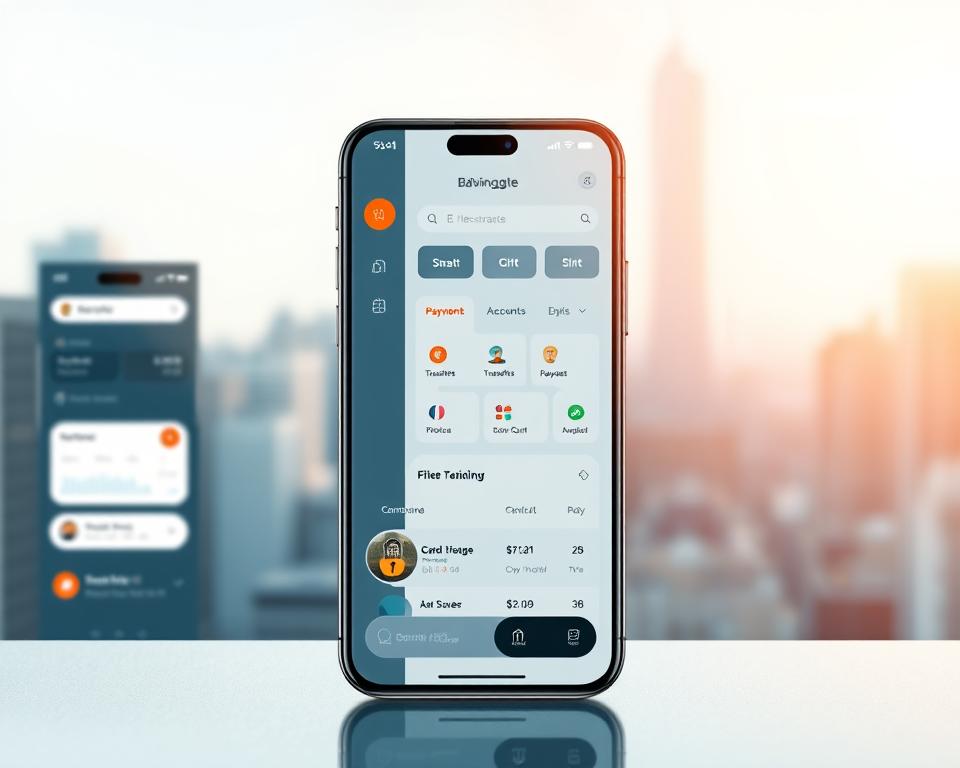Anúncios
The world is seeing big changes in many industries. AI technology applications are changing how businesses work and talk to their customers.
More than 70% of companies are using artificial intelligence in app development. They do this to give customers what they want, work better, and come up with new ideas.
This big move towards AI is changing the tech world. It lets companies make smart choices, connect better with customers, and keep up with others.
Key Takeaways
- The integration of AI in app development is revolutionizing industries.
- Businesses are leveraging AI to provide personalized customer experiences.
- AI technology applications are improving operational efficiency.
- The use of AI is driving innovation and competitiveness.
- Companies are making data-driven decisions with AI.
Introduction to AI-Powered Apps
Technology keeps getting better, and AI apps are leading the way. They’re changing many fields, like customer service, healthcare, and finance. This shows how much AI is impacting tech.
Current State of AI-Powered Apps
Anúncios
AI has made huge strides. Now, apps can do things like analyze data, predict outcomes, and give personalized advice. These apps make life easier for users and help businesses run smoother.
- Customer Service: Chatbots and virtual assistants are changing how we get help.
- Healthcare: AI apps help with diagnosis, treatment plans, and caring for patients.
- Finance: They improve fraud detection, risk management, and help with investments.
AI apps bring many benefits. They make things more efficient, help us make better choices, and offer tailored experiences.
| Industry | AI Application | Benefits |
|---|---|---|
| Customer Service | Chatbots, Virtual Assistants | 24/7 Support, Personalized Experience |
| Healthcare | Diagnosis, Treatment Planning | Accurate Diagnosis, Effective Treatment |
| Finance | Fraud Detection, Risk Management | Enhanced Security, Informed Decisions |
As AI keeps getting better, AI apps will play an even bigger role in our lives and work.
The Rise of Artificial Intelligence in Everyday Applications
AI apps are making our lives more personalized and automated. They’re everywhere, from virtual assistants like Siri and Google Assistant to personalized movie and music picks on Netflix and Spotify.
The advancements in AI apps let technology learn from us. It gets better at knowing what we like over time. This personalization makes using technology more fun and easy.
Personalized Experiences through AI
AI is changing how we enjoy content and use devices. For example, AI looks at what we do to suggest things we might like. This makes finding new stuff easier.
The following table shows how AI makes things more personal in different areas:
| Application | AI-Powered Feature | Benefit to User |
|---|---|---|
| Streaming Services (e.g., Netflix) | Personalized content recommendations | Enhanced content discovery |
| Virtual Assistants (e.g., Siri, Google Assistant) | Voice recognition and task automation | Increased convenience and productivity |
| E-commerce Platforms | Product recommendations based on browsing history | Streamlined shopping experience |
The tech innovation with AI technologies is making things better and introducing new ideas. As AI gets smarter, we’ll see even more ways it fits into our daily lives.
AI-Powered Apps in Business and Enterprise Solutions
Businesses are now using machine learning software tools to boost their work and decision-making.
The use of AI technology applications in business has changed things a lot. It helps companies work better, serve customers better, and make smarter choices.
AI apps in business can quickly and accurately analyze huge amounts of data. This lets businesses understand customer habits, market trends, and how well they’re running.
For example, AI chatbots are helping with customer service. They offer 24/7 help, answer questions, and solve problems fast. Forbes says AI will greatly change business by making customer experiences and operations better.
AI is also used for predictive analytics. Machine learning algorithms predict future trends and outcomes. This helps businesses make early decisions and stay ahead.
- Enhanced operational efficiency
- Improved customer service
- Data-driven decision-making
By using AI apps, businesses can do better now and be ready for the future. The tech world is always changing, and AI helps businesses keep up.
Impact of AI Apps on Healthcare Technology
AI is changing healthcare in many ways, making diagnosis and patient care better. It helps doctors make more accurate diagnoses and tailor treatments. This makes patient care smoother and more effective.
Improving Patient Outcomes with AI
AI apps are transforming healthcare by offering predictive analytics and personalized medicine. They help spot diseases early and create treatment plans that fit each patient. This leads to better health outcomes for patients.
AI is also making a big difference in diagnostic imaging. It can look at medical images like X-rays and MRIs faster and more accurately than doctors. This helps find diseases like cancer sooner.
AI is also improving patient engagement and chronic disease management. AI chatbots and virtual assistants help patients stick to their treatment plans. They also keep an eye on patients’ health and offer timely help.
| AI Application | Healthcare Benefit | Future Potential |
|---|---|---|
| Diagnostic Imaging | Early disease detection | Improved accuracy in complex diagnoses |
| Personalized Medicine | Tailored treatment plans | Genomic-based treatments |
| Patient Engagement | Enhanced patient care | Predictive patient support |
As AI keeps getting better, its impact on healthcare will only grow. With new AI algorithms and data analytics, healthcare will become even more precise and effective. This will help doctors provide better care in the future.
Enhancing Education through AI-Powered Apps
AI-powered apps are changing education by offeringpersonalized learning experiences. They meet the unique needs of each student. This is thanks tomachine learning software tools that study how students do and adjust the lessons.
AI in education does more than just personalize learning. It also helps withautomating grading, so teachers can spend more time on teaching. These apps also improve how students and teachers talk to each other by giving quick feedback.
For example, AI tools can spot where students need help and suggest the right materials. This impact of AI on technology evolution in education is leading to better and more fun learning.
To find out more about AI in education, check out The University of Iowa’s Online Programs. They share how AI is changing education for the better.
AI-powered apps are making learning better, more accessible, and fun for students. As AI keeps getting better, we’ll see even more cool uses in education.
The Role of AI in E-Commerce and Retail
AI technology applications are changing the retail world. AI apps help make shopping more personal and efficient. This boosts sales and makes customers happier.
E-commerce companies use advancements in AI apps to stand out. AI is especially important in personalized shopping experiences.
Personalized Shopping Experiences
AI looks at customer data to suggest tailored product recommendations. This makes shopping better and more likely to lead to a sale.
For example, online stores use AI chatbots for real-time customer support. These chatbots help find products that fit what customers want and need.
AI also helps with supply chain optimization. It analyzes data and predicts demand. This helps manage inventory better, saving costs and speeding up delivery.
- AI-powered product recommendations
- Real-time customer support through chatbots
- Supply chain optimization
AI in e-commerce is changing how businesses work. It lets them offer more personalized and efficient services to customers.
Security and Privacy Concerns with AI Apps
The tech world is facing big security and privacy issues with AI apps. Artificial intelligence is everywhere now, making people worry about their data. This is a big problem.
AI apps collect and use a lot of user data. This raises big questions about how this data is kept safe. Data breaches and unauthorized use are major risks with AI apps.
To get a better understanding of these issues, let’s look at some key points:
- Data Collection and Storage
- User Consent and Transparency
- AI-driven Data Processing
- Regulatory Compliance
Studying these areas is key to understanding AI app security and privacy.
| Concern | Description | Potential Solution |
|---|---|---|
| Data Collection | Excessive data gathering by AI apps | Implement data minimization strategies |
| User Consent | Lack of transparency regarding data use | Enhance user consent mechanisms |
| Data Processing | Risk of biased or insecure processing | Regular audits and bias detection tools |
The table shows some main concerns and possible fixes for AI app security and privacy. By tackling these issues, developers can make AI apps safer and more private.
The future of AI apps depends on finding a balance between tech innovation and strong security. As the tech world grows, keeping user data safe is more important than ever.
The Future of AI-Powered Apps in Communication
The future of communication is being shaped by AI-powered apps. These apps make our interactions more sophisticated and personalized. As AI technology evolves, we’ll see big changes in digital communication.
Advancements in AI Communication Apps
AI-powered communication apps will soon be everywhere, changing how we interact online. They will use AI for better interfaces, security, and user experiences. This will make our digital interactions more intuitive and personal.
- More sophisticated natural language processing (NLP) capabilities
- Enhanced personalization based on user behavior and preferences
- Increased use of augmented reality (AR) and virtual reality (VR) for immersive communication experiences
AI will have a big impact on technology evolution, especially in communication. AI-powered apps will lead to new innovations in communication tech. The table below shows where AI is expected to make a big difference.
| Area of Impact | Current State | Future Development |
|---|---|---|
| NLP Capabilities | Limited understanding of nuances | More sophisticated understanding of context and intent |
| Personalization | Basic personalization based on user data | Advanced personalization using AI-driven insights |
| Immersive Technologies | Early adoption of AR and VR | Widespread use of AR and VR for immersive experiences |
As AI keeps changing communication, we’ll see more innovative apps. These apps will focus on the user, changing how we interact online.
The Gaming Industry and AI Innovations
AI is changing the gaming world, making games more real and personal. Advancements in AI apps help game makers create better worlds. These worlds are more detailed and fun.
AI makes game environments feel more real. Machine learning software tools help with terrain, weather, and character actions. These elements react better to what players do.
Enhanced Gaming Experiences with AI
AI does more than just make things look good. It also makes games feel more personal. AI looks at how players play and changes the game to fit their style.
AI-powered characters can act more like real people. This makes games harder and more fun. Machine learning algorithms help these characters learn from players and change their plans.
To learn more about AI in gaming, check out how AI is changing the gaming world.
The future of gaming is bright with AI getting better. We’ll see even more amazing games as AI keeps improving.
- Enhanced gameplay through personalized experiences
- More realistic game environments
- Intelligent NPCs with complex behaviors
These changes will make games more fun and interactive. As AI gets better, the possibilities for gaming are endless and exciting.
Regulatory Challenges Surrounding AI Technologies
AI technologies are moving fast, but laws are struggling to keep up. This is causing big problems. The fast growth of AI has made it hard for regulators to keep up.
Regulators face a big challenge. They need to support innovation while keeping things safe and private. AI-powered apps are especially tricky because they’re used in so many areas.
Another big issue is that laws vary a lot around the world. This makes it hard for developers and businesses to know what to do. It could slow down the use of AI globally.
Key Regulatory Challenges
- Insufficient Data Protection: AI uses a lot of personal data, which raises privacy and security concerns.
- Lack of Transparency: Some AI systems are hard to understand, making it tough for regulators to check on them.
- Accountability: As AI gets more independent, it’s unclear who should be responsible for its actions.
To tackle these issues, regulators are looking at new rules and guidelines. For example, some places are making their data protection laws stricter. Others are funding AI research to learn more about it.
| Regulatory Approach | Description | Potential Impact |
|---|---|---|
| Stricter Data Protection Laws | Enhanced regulations to safeguard personal data used by AI systems | Increased trust in AI technologies, potential reduction in data breaches |
| AI Research Initiatives | Government-funded research to understand AI’s societal implications | Better-informed regulatory decisions, potential for more effective oversight |
| International Cooperation | Collaboration among countries to establish standardized AI regulations | Simplified global compliance, reduced regulatory confusion |
In conclusion, dealing with AI’s regulatory challenges is complex. We need a careful approach to balance innovation with safety and privacy. This way, we can support tech innovation with AI technologies while keeping things safe.
The Long-Term Effects of AI on Job Markets
AI is changing the job market in big ways. As artificial intelligence in app development grows, we must think about its long-term job effects.
AI can automate simple tasks, letting humans do more complex and creative work. This could make us more productive and create new jobs in AI.
The future of work with AIisn’t just about losing jobs. It’s also about new industries and jobs we can’t predict yet. But, AI might make some groups more unequal.
The Future of Work with AI
To deal with AI’s challenges and chances, we need to focus on a few things:
- Education and retraining programs to keep up with AI’s economy.
- Policies to help those who lose jobs because of AI.
- New jobs in AI development, deployment, and ethics.
Understanding AI’s impact on technology evolution helps us prepare for its changes. We should invest in education, encourage lifelong learning, and develop AI that works with humans.
In summary, AI’s job market effects depend on how we use and manage it. By being proactive and flexible, we can make AI help us have better, more fair jobs.
Conclusion: The Path Forward for AI-Powered Applications
The future of tech trends is being shaped by advancements in AI apps. These changes are transforming various sectors. They are also changing how we live and work.
AI’s impact on healthcare, education, and e-commerce will be huge. It will drive innovation and make things more efficient.
It’s important for businesses and organizations to embrace this technology. Doing so helps them stay ahead and take advantage of new opportunities.
The future of AI-powered applications looks bright. There’s potential for big breakthroughs in natural language processing and computer vision.
However, we must address AI’s challenges. This includes security and privacy concerns. We need to ensure a smooth transition to an AI-driven future.



